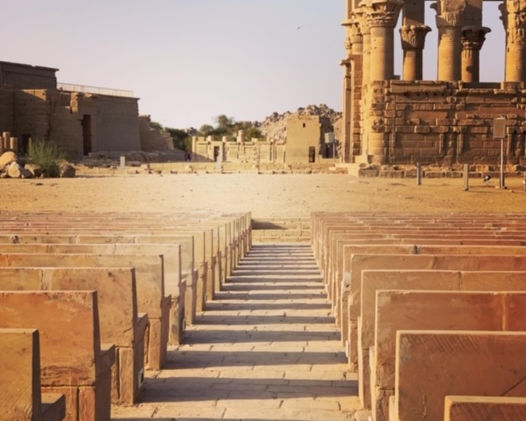
EGYPT
We’re certainly not in Kansas anymore, and Cairo hits you around the head like a sock full of sand. It’s big, it’s busy, it’s wild, and it’s so amazing! If you are anything like us, you may be nervous and worried about what to expect. We will say that the welcome received by so many people in this country has been unbelievable, and we can't wait to return!
Much of Egypt's ancient history was a mystery until the secrets of ancient Egyptian hieroglyphs were deciphered with the discovery and help of the Rosetta Stone. Among the Seven Wonders of the Ancient World, the Great Pyramid of Giza is the only one still standing.
Did you know: The Egyptians invented the 365-day-a-year calendar, and Greater Cairo is the largest city in Africa and the Middle East. Did you also know that Ancient Egyptian pyramids were built as tombs for pharaohs (rulers of Ancient Egypt) and their families? To date, over 130 pyramids have been discovered in Egypt.
So, if you are excited to take that bucket list trip to the land of the pharaohs but are curious about what to expect, here are a few travel tips you may find helpful as you start making this dream destination a reality.
What To Pack: Casual, light, comfortable weather clothing for sightseeing most of the year. You can expect summer weather the majority of the time. Bring a light jacket or sweater for the evenings. A hat, sunscreen, and sunglasses are always recommended.
Pack a bathing suit if visiting Aswan and Luxor or taking a Nile Cruise.
AT ALL TIMES: Modesty in clothing should be observed; wear bathing suits and shorts only at the beach or swimming pools. A good rule is to cover your back and shoulders outside the hotel area. Women should wrap their arms when visiting mosques. Bring comfortable walking shoes for sightseeing and walking on desert sand. Sunglasses, sun visors, hats, and scarves are recommended as protection against the intense sun. On a Nile cruise, dress is strictly informal unless mentioned otherwise on your itinerary.
Passport/Visa Requirements: Your passport must have at least six months of validity beyond your return date. A tourist Visa is also required and can be obtained upon arrival at the airport. The cost is USD 25 and must be paid in Cash.
Electricity: The electricity supply in Egypt is 220/240 volts at 50 cycles. You will need a suitable adapter and converter if your appliances cannot handle dual voltage.
Languages: The official language is Egyptian Arabic, but English is widely spoken and understood.
Tipping and $1 Bills: If we can offer any advice, bring several dollar bills with you. While the monetary unit is the Egyptian Pound (EGP), the US dollar is widely accepted throughout Egypt. Tipping in Egypt is customary and widely expected from anyone who has provided a service (servers, drivers, guides). A 10%-15% service charge might or might not be added to your restaurant bill. Tipping during each of your personalized tours is a very personal subject, and there are no rules, just guidelines and some expectations. The last day of the tour is the customary time to extend gratuities to your escort, guide, and driver.
Recommended Tipping Guide:
Transfer Assistant: $1 per person/service
Tour Guide: $8-10 per person per day
Bus Drivers: $5 per person/day
Porter or Baggage Handler: $2 per person in & out
Horseman in Edfu: $5 per carriage/ride
Motorboat: $2 per person/per way
Cruise Staff: $5-7 per person per night Felucca in Aswan: $3 per person
Places To See:
-
Cairo's visit to Egypt wouldn't be complete without visiting the Egyptian Museum of Antiquities to see the world's most extensive collection of Pharaonic artifacts and the treasures of Tutankhamun's tomb. And a visit to the Great Pyramids of Giza and the enigmatic Sphinx is a must.
-
Nile Cruise-River cruise down the Nile in style. Visit the Temple of Isis at Philae, sail on board a felucca, a traditional Egyptian sailboat, and sail to Kom Ombo, where you will visit the Ptolemaic Temple of Sobek and Haroeris before arriving in Edfu
-
Luxor- The Valley of the Kings, the Funerary Temple of Queen Hatshepsut at Deir El Bahari, and the Colossi of Memnon....all amazing and more spectacular than the rest.
Pictures: You will need a flash to photograph inside monuments. You need special permission from the Ministry of Culture and information to take pictures in the Egyptian Museum and some of the Tombs. Remember to keep your camera in a plastic bag to protect it from the fine sand and dust.
NOTE: You CANNOT photograph bridges, dams, ports, airports, and other restricted areas that are marked. Expect to pay small tips for pictures or video filming.
Health Tip: Hydrate, hydrate, hydrate. Do not leave your hotel each day without having plenty of water on hand. While it may be dry, it is HOT outside, and it's essential to drink water often. In addition, don't forget to pack plenty of travel-size Kleenex. Toilet paper is seldom in stalls – an attendant may provide it as you enter for a tip. Do not flush paper – deposit it in the bin next to the toilet.
Empowering you to live well + travel!


















